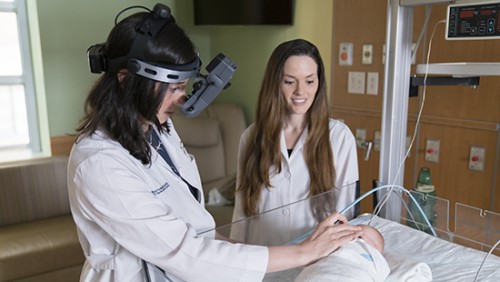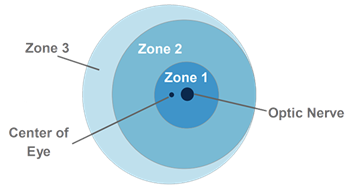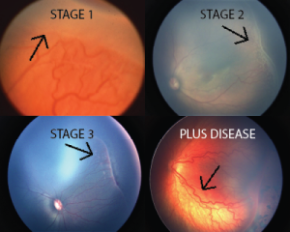Retinopathy of Prematurity (ROP)

Retinopathy of prematurity (ROP) is a condition that can of can cause irreversible blindness in premature babies, if not properly treated.
ROP affects the blood vessels in the retina, the back part of the eye that helps us to see. When a baby is born prematurely, the blood vessels in the eye have not finished growing.
Babies that are born 2 or more months early or with a birth-weight under 1500 grams are most at risk.
In ROP, the eye grows new blood vessels the wrong way. These vessels can damage the retina and cause blindness.
Though it can be a serious diagnosis, it is treatable, and blindness is preventable if the parents bring their baby to regular eye appointments.
At University of Maryland Eye Associates our pediatric ophthalmology team is committed to working closely with parents and their babies during this critical period that can determine their vision for life and beyond.
Preventing Blindness from ROP
If your child was born prematurely, even by 2 or more months early, it is very important to get your baby's eyes checked regularly by an eye doctor. Their eyes must be checked both at the hospital and after they leave.
If your child has ROP, it may not be cured by the time they leave the hospital. Your doctor will tell you when to bring your child back for eye exams.
Keeping Appointments Is Very Important
It is very important to keep these appointments. Get your baby's eyes checked on time or the ROP can become worse and cause blindness.
This is not reversible. The sooner we notice the signs, the sooner we can treat and prevent blindness.
Risks of ROP

About half of low birth-weight babies in the United States will develop ROP. In about 9 out of 10 cases of ROP, the baby's eyes will get better without treatment.
In some cases, the baby needs treatment to stop damage to the retina.
Without treatment, the baby can become blind.
Other Eye Problems for Premature Babies
There are other eye problems that can happen in premature babies. Eye exams check for these issues. These problems include:
- Lazy eye
- Crossed eye
- Need for glasses
Diagnosing ROP
The eye doctor will look inside the baby's eyes to tell whether or not they have ROP. The doctor will examine the blood vessels in the retina.
He or she will describe the vessels using the terms zones, stages and plus disease.
- Zone tells you the part of the eye where the vessels have stopped growing.
- Stage explains how severe the ROP is.
- Plus disease is when the vessels also look large and twisted.
Doctors decide if your baby needs ROP treatment based on the zone and stage, and whether they have plus disease.

Stages of ROP
- Stage 0: No clear line where the vessels stop
- Stage 1: Line where the vessels stop
- Stage 2: Raised bump where the vessels stop
- Stage 3: New, abnormal vessels are growing
- Stage 4: Some of the retina detaches (pulls away)
- Stage 5: All of the retina detaches (pulls away)
Treatments for ROP
If the eye doctor decides that your baby needs treatment, there are two choices.
- Laser Surgery - The doctor can do a surgery with a laser. The part of the retina without blood vessels gets laser treatment. It stops vessels that are not normal from growing. This is the most common treatment and works very well.
- Medicine - The eye doctor can inject a medicine into the eye. This medicine stops the new vessels that are not growing normally. There is still more research to be done on this treatment.
Make an Appointment
To schedule an appointment with one of our pediatric eye doctors, please call 667-214-1111.
Our Pediatric Ophthalmologists
Clinical Nurse
- Kristin Williams, NP



